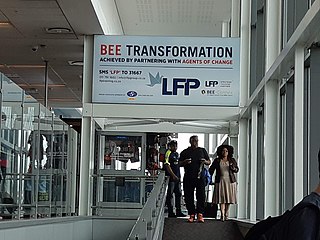Related Research Articles

The Levellers were a political movement active during the English Civil War who were committed to popular sovereignty, extended suffrage, equality before the law and religious tolerance. The hallmark of Leveller thought was its populism, as shown by its emphasis on equal natural rights, and their practice of reaching the public through pamphlets, petitions and vocal appeals to the crowd.

A trust is a legal relationship in which the owner of property, or any transferable right, gives it to another to manage and use solely for the benefit of a designated person. In the English common law, the party who entrusts the property is known as the "settlor", the party to whom it is entrusted is known as the "trustee", the party for whose benefit the property is entrusted is known as the "beneficiary", and the entrusted property is known as the "corpus" or "trust property". A testamentary trust is an irrevocable trust established and funded pursuant to the terms of a deceased person's will. An inter vivos trust is a trust created during the settlor's life.

A cooperative is "an autonomous association of persons united voluntarily to meet their common economic, social and cultural needs and aspirations through a jointly owned and democratically-controlled enterprise". Cooperatives are democratically controlled by their members, with each member having one vote in electing the board of directors. They differ from collectives in that they are generally built from the bottom-up, rather than the top-down. Cooperatives may include:
Eminent domain, also known as land acquisition, compulsory purchase, resumption, resumption/compulsory acquisition, or expropriation, is the compulsory acquisition of private property for public use. It does not include the power to take and transfer ownership of private property from one property owner to another private property owner without a valid public purpose. This power can be legislatively delegated by the state to municipalities, government subdivisions, or even to private persons or corporations, when they are authorized to exercise the functions of public character.

A charitable organization or charity is an organization whose primary objectives are philanthropy and social well-being.
A worker cooperative is a cooperative owned and self-managed by its workers. This control may mean a firm where every worker-owner participates in decision-making in a democratic fashion, or it may refer to one in which management is elected by every worker-owner who each have one vote. Worker cooperatives may also be referred to as labor-managed firms.

Black Economic Empowerment (BEE) is a policy of the South African government which aims to facilitate broader participation in the economy by black people. A form of affirmative action, it is intended especially to redress the inequalities created by apartheid. The policy provides incentives – especially preferential treatment in government procurement processes – to businesses which contribute to black economic empowerment according to several measurable criteria, including through partial or majority black ownership, hiring black employees, and contracting with black-owned suppliers. The preferential procurement aspect of BEE has been viewed as paradigmatic of a sustainable procurement approach, whereby government procurement is used to advance social policy objectives. So-called "BEE deals" – transactions aiming to increase black ownership of large businesses – have been conducted on a large scale, with BEE transactions concluded between 1994 and 2005 valued at between R150 billion and R285 billion.
A social enterprise is an organization that applies commercial strategies to maximize improvements in financial, social and environmental well-being. This may include maximizing social impact alongside profits for co-owners.

A community interest company is a form of social enterprise in the United Kingdom intended "for people wishing to establish businesses which trade with a social purpose..., or to carry on other activities for the benefit of the community".

The economy of Scotland is an open mixed economy, mainly services based, which is the second largest economy amongst the countries of the United Kingdom. It had an estimated nominal gross domestic product (GDP) of £218.0 billion in 2023, including oil and gas extraction in the country's continental shelf region. Since the Acts of Union 1707, Scotland's economy has been closely aligned with the economy of the rest of the United Kingdom (UK), and England has historically been its main trading partner. Scotland conducts the majority of its trade within the UK: in 2017, Scotland's exports totalled £81.4 billion, of which £48.9 billion (60%) was within the UK, £14.9 billion with the European Union (EU), and £17.6 billion with other parts of the world. Scotland's imports meanwhile totalled £94.4 billion including intra-UK trade leaving Scotland with a trade deficit of £10.4 billion in 2017.
Community-owned assets or organizations are those that are owned and controlled through some representative mechanisms that allow a community to influence their operation or use and to enjoy the benefits arising.

Land reform in Scotland is the ongoing process by which the ownership of land, its distribution and the law which governs it is modified, reformed and modernised by property and regulatory law.

Community wind projects are locally owned by farmers, investors, businesses, schools, utilities, or other public or private entities who utilize wind energy to support and reduce energy costs to the local community. The key feature is that local community members have a significant, direct financial stake in the project beyond land lease payments and tax revenue. Projects may be used for on-site power or to generate wholesale power for sale, usually on a commercial-scale greater than 100 kW.
In financial accounting, an asset is any resource owned or controlled by a business or an economic entity. It is anything that can be used to produce positive economic value. Assets represent value of ownership that can be converted into cash . The balance sheet of a firm records the monetary value of the assets owned by that firm. It covers money and other valuables belonging to an individual or to a business. Total assets can also be called the balance sheet total.
The social dividend is the return on the natural resources and capital assets owned by society in a socialist economy. The concept notably appears as a key characteristic of market socialism, where it takes the form of a dividend payment to each citizen derived from the property income generated by publicly owned enterprises, representing the individual's share of the capital and natural resources owned by society.
Economic democracy is a socioeconomic philosophy that proposes to shift ownership and decision-making power from corporate shareholders and corporate managers to a larger group of public stakeholders that includes workers, consumers, suppliers, communities and the broader public. No single definition or approach encompasses economic democracy, but most proponents claim that modern property relations externalize costs, subordinate the general well-being to private profit and deny the polity a democratic voice in economic policy decisions. In addition to these moral concerns, economic democracy makes practical claims, such as that it can compensate for capitalism's inherent effective demand gap.

In business, and only in United States corporate law, a benefit corporation is a type of for-profit corporate entity whose goals include making a positive impact on society. Laws concerning conventional corporations typically do not define the "best interest of society", which has led some to believe that increasing shareholder value is the only overarching or compelling interest of a corporation. Benefit corporations explicitly specify that profit is not their only goal. An ordinary corporation may change to a benefit corporation merely by stating in its approved corporate bylaws that it is a benefit corporation.
Social ownership is a type of property where an asset is recognized to be in the possession of society as a whole rather than individual members or groups within it. Social ownership of the means of production is the defining characteristic of a socialist economy, and can take the form of community ownership, state ownership, common ownership, employee ownership, cooperative ownership, and citizen ownership of equity. Within the context of socialist economics it refers particularly to the appropriation of the surplus product produced by the means of production to society at large or the workers themselves. Traditionally, social ownership implied that capital and factor markets would cease to exist under the assumption that market exchanges within the production process would be made redundant if capital goods were owned and integrated by a single entity or network of entities representing society. However, the articulation of models of market socialism where factor markets are utilized for allocating capital goods between socially owned enterprises broadened the definition to include autonomous entities within a market economy.

The Community Empowerment (Scotland) Act 2015 is an Act of the Scottish Parliament. The act is notable for expanding the Community Right to Buy established by the Land Reform (Scotland) Act 2003 to include urban communities and for introducing new powers for Scottish Ministers to compel owners of abandoned or neglected to land to interested community bodies.
References
- ↑ "A history of community asset ownership « Locality". locality.org.uk. Archived from the original on 2013-10-15. Retrieved 2016-03-23.
- ↑ "BBC Two - the Secret History of Our Streets, Series 2, the Fittie Squares, Aberdeen". Archived from the original on 2014-10-22. Retrieved 2016-03-23.
- ↑ "From the Low Tide of the Sea to the Highest Mountain Top | the Islands Book Trust". Archived from the original on 2016-04-02. Retrieved 2016-03-23.
- ↑ "The Train Now Departing - 6. The Survivors". Archived from the original on 2017-09-29. Retrieved 2018-02-13.
- ↑ "Power to Change | the National Lottery Community Fund". Archived from the original on 2016-04-06. Retrieved 2016-03-23.
- ↑ "Archived copy" (PDF). Archived from the original (PDF) on 2016-04-16. Retrieved 2016-03-23.
{{cite web}}: CS1 maint: archived copy as title (link) - ↑ "What is a community business? - Power to Change". www.thepowertochange.org.uk. Archived from the original on 2015-10-04.
- ↑ "Community Empowerment (Scotland) Bill". 3 June 2018. Archived from the original on 16 April 2016. Retrieved 23 March 2016.
- ↑ "Consultation on Supporter Involvement in Scottish Football Clubs". Archived from the original on 2016-01-01.